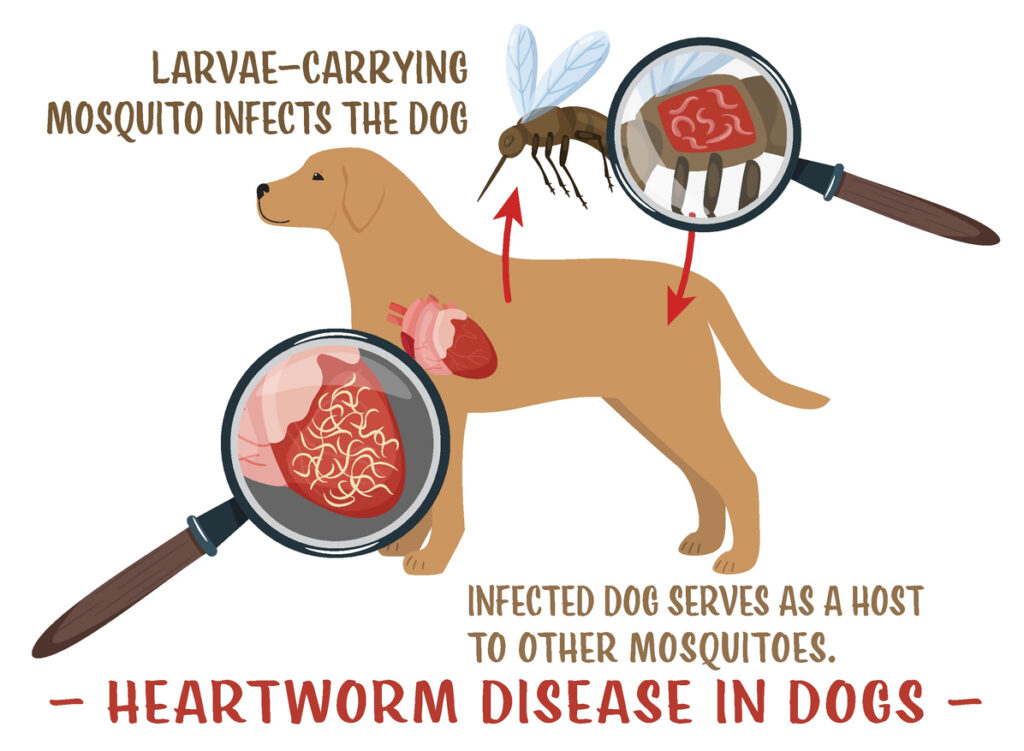Heartworms are a serious and potentially life-threatening parasite that can affect your dog’s heart, lungs, and blood vessels. Understanding what heartworms are, how they spread, and how to prevent them is crucial for every pet owner. In this blog, we’ll break down the essentials about heartworms and provide you with the information you need to keep your dog safe.

What Are Heartworms?
Heartworms are parasitic worms that can live in the heart, lungs, and associated blood vessels of affected pets, most commonly dogs. These worms can cause significant damage to the tissues they inhabit, leading to lung disease, heart failure, and damage to other organs in severe cases. Heartworms are a serious health threat, and the impact on an infected dog can be devastating.
How Do Dogs Get Heartworms?
Unlike many other parasites, heartworms are spread by mosquitoes. Here’s how it works:
- Mosquitoes as Carriers: When a mosquito bites an infected animal, it ingests immature heartworm larvae present in the blood.
- Transmission: The same mosquito can then bite another dog, transferring these larvae through the bite wound.
- Maturation: Once inside the new host, the larvae travel to the dog’s heart and lungs, where they mature into adult heartworms. Female heartworms can grow to be over a foot long.
This mosquito-borne transmission makes heartworm a concern in many regions, particularly during warmer months when mosquitoes are active.
Signs and Symptoms of Heartworm Disease
Heartworm infection can be difficult to detect in its early stages because dogs often do not show symptoms until the infection has progressed. Common signs to watch for include:
- Coughing
- Shortness of breath with mild exercise
- Lethargy or a decrease in activity level
These symptoms can be subtle and are not unique to heartworm disease, making it essential to consult your veterinarian if you notice any changes in your dog’s behavior or health. The only way to definitively diagnose heartworm infection is through a blood test performed by your veterinarian.
Preventing Heartworm Disease
The good news is that heartworm disease is preventable. Here’s how you can protect your dog:
- Monthly Preventatives: Heartworm preventatives are available in various forms, most commonly as a monthly pill. These medications are designed to kill the larvae before they can mature into adult worms.
- Combination Treatments: Many heartworm preventatives also protect against other parasites like fleas, ticks, and intestinal worms.
- Veterinary Guidance: Work with your primary care veterinarian to select the right heartworm prevention plan for your dog. There are several brands and formulations available, so your vet can help determine the best option based on your dog’s needs and lifestyle.
Why Preventative Care Matters
Heartworm disease can be difficult and expensive to treat, especially in advanced cases. Prevention is not only easier but also much safer for your pet. Regular use of heartworm preventatives is a simple and effective way to protect your dog from this serious disease.
Conclusion
Heartworms are a dangerous parasite, but with proper prevention, you can keep your dog safe and healthy. If you have any concerns about heartworm disease, speak with your primary care veterinarian—they are your best resource for information and guidance on protecting your pet. Remember, preventing heartworm disease is much simpler and more effective than treating it.